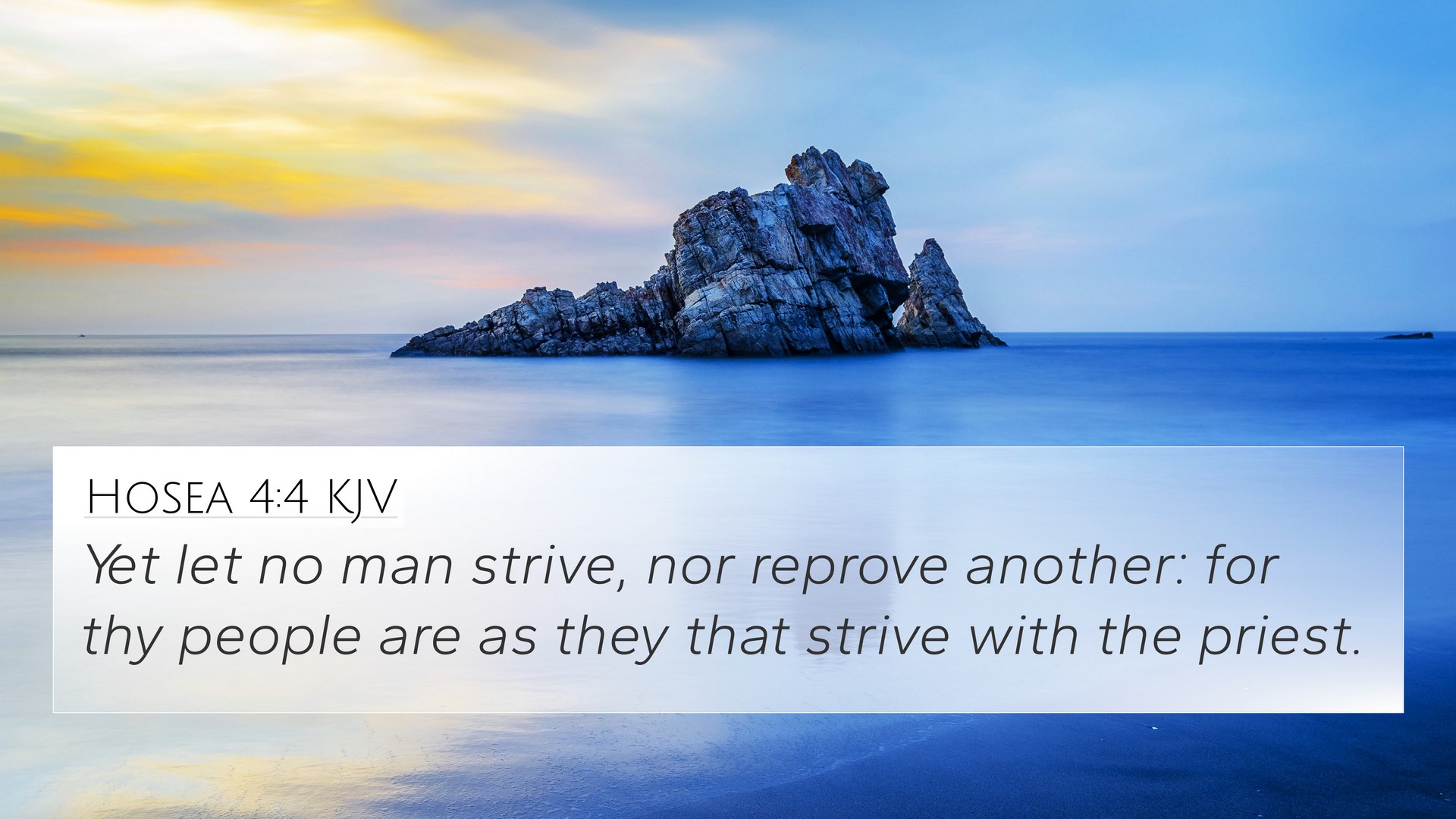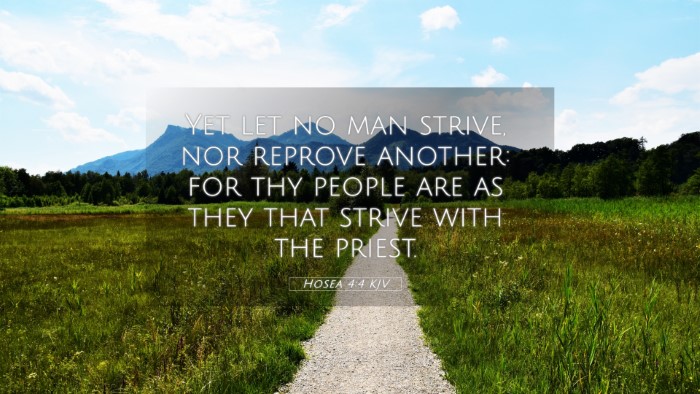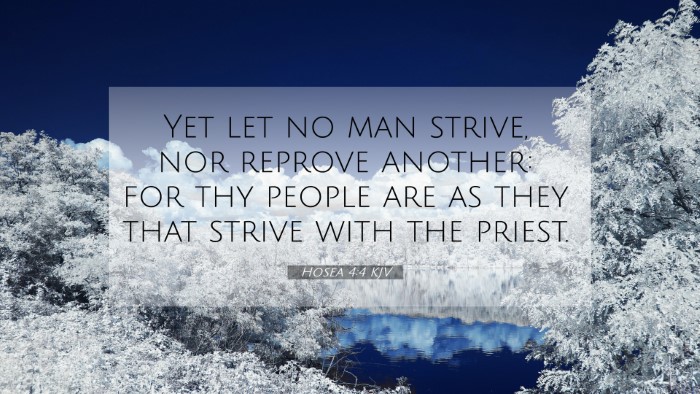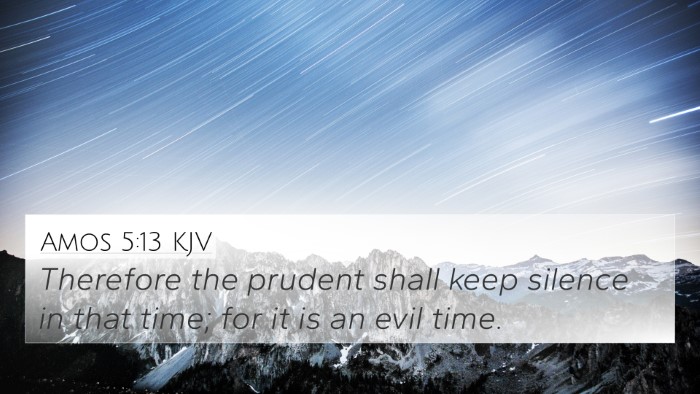Old Testament
Genesis Exodus Leviticus Numbers Deuteronomy Joshua Judges Ruth 1 Samuel 2 Samuel 1 Kings 2 Kings 1 Chronicles 2 Chronicles Ezra Nehemiah Esther Job Psalms Proverbs Ecclesiastes Song of Solomon Isaiah Jeremiah Lamentations Ezekiel Daniel Hosea Joel Amos Obadiah Jonah Micah Nahum Habakkuk Zephaniah Haggai Zechariah MalachiHosea 4:4 Similar Verses
Hosea 4:4 Cross References
Yet let no man strive, nor reprove another: for thy people are as they that strive with the priest.
Uncover the Rich Themes and Topics of This Bible Verse
Listed below are the Bible themes associated with Hosea 4:4. We invite you to explore each theme to gain deeper insights into the Scriptures.
Hosea 4:4 Cross Reference Verses
This section features a detailed cross-reference designed to enrich your understanding of the Scriptures. Below, you will find carefully selected verses that echo the themes and teachings related to Hosea 4:4 KJV. Click on any image to explore detailed analyses of related Bible verses and uncover deeper theological insights.
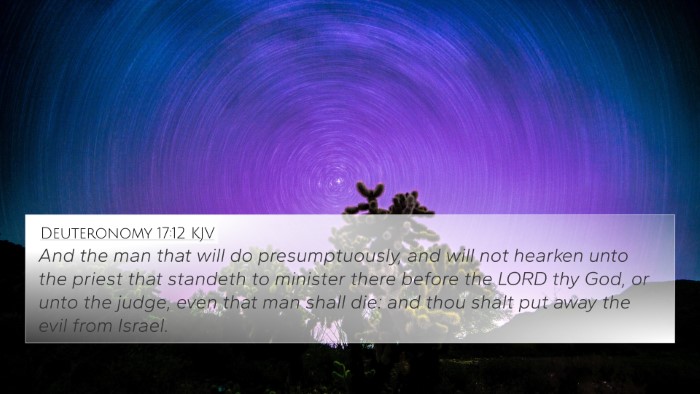
Deuteronomy 17:12 (KJV) »
And the man that will do presumptuously, and will not hearken unto the priest that standeth to minister there before the LORD thy God, or unto the judge, even that man shall die: and thou shalt put away the evil from Israel.
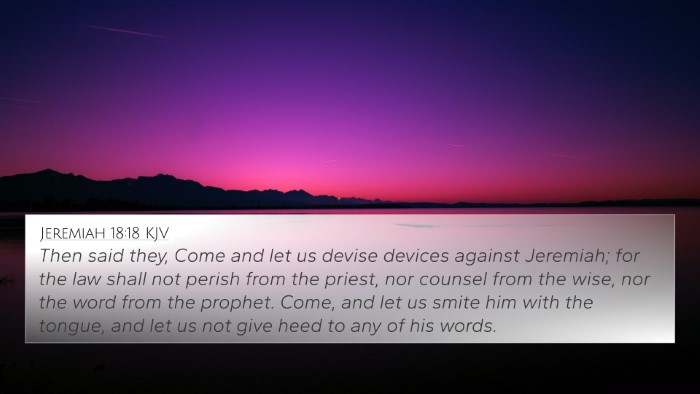
Jeremiah 18:18 (KJV) »
Then said they, Come and let us devise devices against Jeremiah; for the law shall not perish from the priest, nor counsel from the wise, nor the word from the prophet. Come, and let us smite him with the tongue, and let us not give heed to any of his words.

Ezekiel 3:26 (KJV) »
And I will make thy tongue cleave to the roof of thy mouth, that thou shalt be dumb, and shalt not be to them a reprover: for they are a rebellious house.
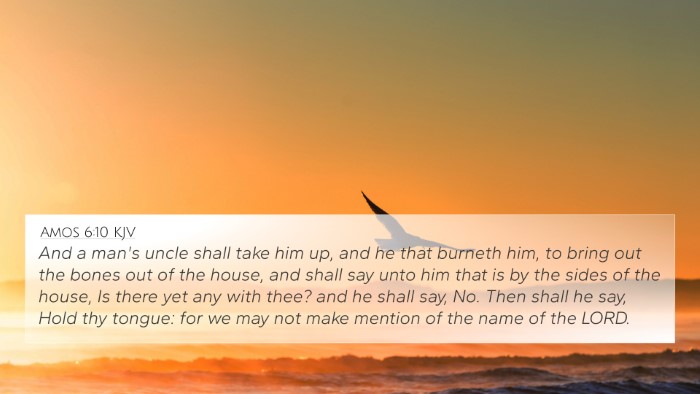
Amos 6:10 (KJV) »
And a man's uncle shall take him up, and he that burneth him, to bring out the bones out of the house, and shall say unto him that is by the sides of the house, Is there yet any with thee? and he shall say, No. Then shall he say, Hold thy tongue: for we may not make mention of the name of the LORD.
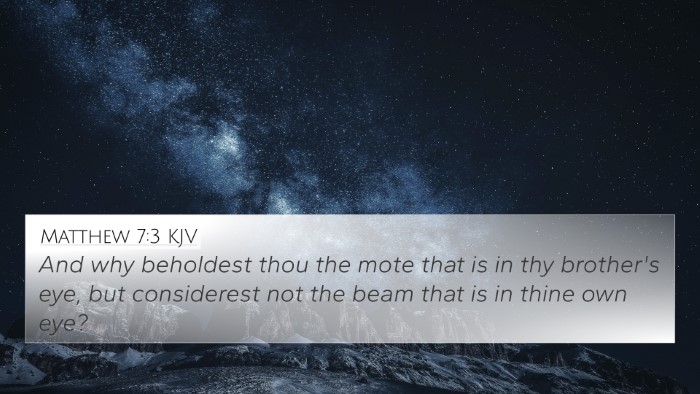
Matthew 7:3 (KJV) »
And why beholdest thou the mote that is in thy brother's eye, but considerest not the beam that is in thine own eye?
Hosea 4:4 Verse Analysis and Similar Verses
Understanding Hosea 4:4
Bible Verse: Hosea 4:4
"Yet let no man strive, nor reprove another: for thy people are as they that strive with the priest."
Summary of Key Insights
The verse from Hosea 4:4 presents a critical perspective on the people of Israel and their spiritual behavior. The prophet Hosea admonishes the Israelites, emphasizing their flawed relationship with God as well as with their leaders, representing both the moral and spiritual decline of the nation.
Commentary Insights
- Matthew Henry: Matthew Henry highlights that the people of Israel are encouraged to avoid disputes among themselves. He suggests that their arguments are unproductive and emphasize their disrespect toward the priests, who serve as mediators between them and God. Henry underscores the reality that internal conflicts only deepen their estrangement from God.
- Albert Barnes: Barnes focuses on the social structure of Israel and notes that the priesthood had become compromised. He interprets this passage as a call to unity among the people, warning that striving with one another, especially opposing their spiritual leaders, only leads to further rebellion against God.
- Adam Clarke: Clarke provides a detailed historical context, explaining that the priestly role was divinely instituted, and the strife against them signals a larger spiritual crisis. He argues that the people's condemnation is well-deserved because they have strayed far from God's covenant and abandoned the moral law.
Context of Hosea 4:4
This verse is located in a chapter where Hosea outlines the various grievances God has against His people. Here, the emphasis on the need for peace among the people rather than conflict signifies that self-division leads them away from righteousness and toward further judgment.
Cross-References
- Jeremiah 5:31 - Reiteration of spiritual leaders being forsaken by the people.
- Micah 3:5 - Condemnation of false prophets for misleading the people.
- Matthew 12:25 - A principle that a divided house cannot stand, emphasizing unity.
- 1 Corinthians 1:10 - Call for unity among believers to avoid divisions.
- 2 Timothy 2:23 - Instruction to avoid foolish and ignorant disputes.
- Hosea 5:1 - The negligence of priests leading to collective consequences.
- James 3:16 - Highlights that where there is strife, there is every evil work.
- Proverbs 15:18 - A gentle response can turn away wrath, contrasting strife.
- Philippians 2:14 - Encouragement to do all things without murmurings and disputings.
- Isaiah 3:12 - Warnings about the woes of a people whose leaders misguide them.
Thematic Connections
The themes present in Hosea 4:4 resonate deeply throughout both the Old and New Testaments. The following thematic connections are evident:
- Conflict Resolution: The need for peaceful coexistence among believers is echoed in various scriptures, emphasizing the importance of unity within the church.
- Divine Authority: The rejection of spiritual leaders often leads to disastrous consequences for the people, as seen in several prophetic books.
- Spiritual Accountability: Followers are called to remain aligned with God’s commandments and respect His chosen leaders.
Practical Applications
Readers can draw several practical applications from Hosea 4:4:
- Encouragement to foster environments of peace and understanding, both in church settings and within families.
- A reminder to uphold and respect spiritual leaders who guide in faith.
- A call to introspection regarding how personal conflicts can detract from spiritual unity and collective worship.
Conclusion
Hosea 4:4 serves as a poignant reminder of the importance of unity among God’s people. Through tensions during conflict, it invites further exploration into understanding God’s desire for harmony. By cross-referencing this scripture with related passages, believers are equipped to deepen their scriptural understanding and promote discussions that lead to stronger connections within their faith. This verse, although brief, encapsulates profound truths about the spiritual state of a community disconnected from its divine source.
